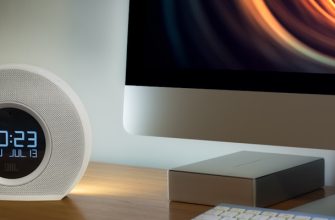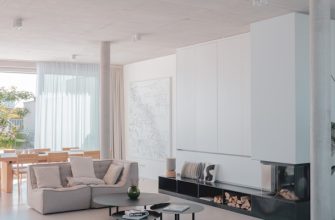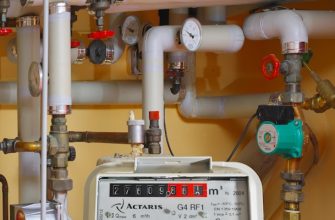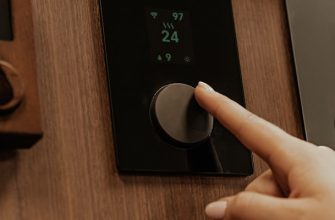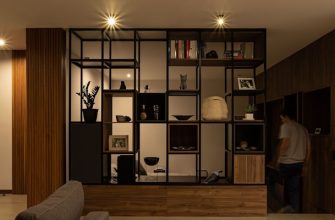- Transforming Living Spaces: The Impact of Smart Home Technologies
- Enhancing Comfort and Convenience Through Automation
- The Future of Home Living: Smart Solutions for Everyday Challenges
- Energy Efficiency and Sustainability: Smart Homes Leading the Way
- Safety and Security: How Smart Homes Protect Your Family
- Integrating Smart Technology: A Seamless Approach to Modern Living
Transforming Living Spaces: The Impact of Smart Home Technologies
Smart home technologies have revolutionized the way people interact with their living spaces, enhancing both comfort and quality of life. These innovations automate routine tasks, allowing homeowners to control various aspects of their homes with ease. The integration of smart devices not only promotes efficiency but also contributes to energy savings, making modern living more sustainable.
- Lighting Control: Smart lighting systems adapt to daily routines, providing optimal illumination while reducing energy consumption.
- Climate Management: Smart thermostats learn user preferences, adjusting heating and cooling systems automatically to maintain a comfortable environment.
- Security Features: Smart surveillance cameras and alarms offer enhanced protection, allowing homeowners to monitor their property remotely.
- Home Appliances: Smart kitchen gadgets and laundry machines streamline household chores, saving time and effort for residents.
- Entertainment Systems: Smart audio-visual setups create immersive experiences, allowing users to enjoy their favorite media seamlessly.
The impact of smart home technologies extends beyond convenience; it fosters a healthier lifestyle. With features such as air quality monitoring and automated health reminders, individuals can manage their well-being more effectively. Furthermore, the adaptability of smart systems ensures that homes evolve with their inhabitants’ needs, making them suitable for diverse lifestyles and preferences.
In summary, the integration of smart home technologies transforms living spaces into hubs of comfort and efficiency. By enhancing daily routines and promoting well-being, these innovations are shaping the future of home living, ultimately leading to a higher quality of life.
Enhancing Comfort and Convenience Through Automation
Automation plays a pivotal role in enhancing comfort and convenience within the framework of a smart home. By integrating advanced technologies, residents can enjoy a level of control and ease that significantly improves their daily lives. Smart home devices, such as thermostats, lighting systems, and security cameras, work in unison to create a seamless living environment.
- Smart Thermostats: These devices learn user preferences and automatically adjust the temperature, ensuring optimal comfort while reducing energy consumption.
- Automated Lighting: Homeowners can set schedules or control lights remotely, creating the perfect ambiance for any occasion, and enhancing convenience.
- Smart Security Systems: Enhanced security features provide peace of mind, allowing homeowners to monitor their property in real-time from anywhere in the world.
- Voice-Controlled Assistants: Smart speakers allow users to control various devices with voice commands, making daily tasks simpler and more efficient.
These technological advancements not only streamline household tasks but also contribute to a more enjoyable living experience. The integration of smart technology facilitates the management of household chores, enabling residents to focus on what truly matters. With automation, every aspect of a smart home is designed to prioritize comfort and convenience, ultimately leading to a higher quality of life.
Incorporating automation within a smart home not only elevates the lifestyle of its inhabitants but also promotes energy efficiency. By optimizing the use of resources, smart technologies help in reducing utility bills while enhancing the overall comfort of the home. This balance between sustainability and convenience underscores the transformative power of smart home innovations.
The Future of Home Living: Smart Solutions for Everyday Challenges
In the modern era, the concept of a smart home has transformed the way people interact with their living spaces. Smart home technology enhances the quality of life by providing innovative solutions to everyday challenges. From energy management to security systems, these advancements significantly increase convenience and comfort in daily routines.
- Energy Efficiency: Smart thermostats and lighting systems can be programmed to optimize energy usage, reducing utility bills and environmental impact.
- Security Enhancements: Smart security cameras and alarm systems offer real-time monitoring capabilities, ensuring peace of mind for homeowners.
- Home Automation: Devices such as smart speakers and home assistants streamline household tasks, enabling voice control for various functions.
- Health Monitoring: Smart home technology can also include health tracking devices, providing insights into the well-being of residents and promoting a healthier lifestyle.
As the technology continues to evolve, the integration of smart solutions within homes will further simplify daily living. Homeowners can expect improved connectivity among devices, allowing for seamless interaction and enhanced automation. This interconnectedness not only maximizes efficiency but also fosters a more sustainable lifestyle.
The future of home living is undoubtedly tied to smart home innovations. As these technologies become more accessible, they will redefine comfort and convenience, making life easier for individuals and families alike. Embracing smart home solutions leads to a more efficient, secure, and enjoyable living environment.
Energy Efficiency and Sustainability: Smart Homes Leading the Way
Energy efficiency and sustainability are crucial aspects of modern living, and smart homes exemplify how technology can enhance both. By integrating intelligent systems, households can significantly reduce energy consumption while promoting a greener lifestyle. Smart home devices, such as thermostats, lighting, and appliances, are designed to optimize energy usage, ensuring that resources are used efficiently.
- Smart Thermostats: These devices learn user preferences and adjust heating and cooling settings accordingly, leading to substantial energy savings.
- Automated Lighting: Smart lighting systems can be programmed to turn off when not in use, minimizing electricity waste.
- Energy Monitoring: Smart meters provide real-time data on energy consumption, allowing homeowners to make informed decisions about their usage patterns.
- Smart Appliances: Many modern appliances are designed for energy efficiency, using less power without compromising performance.
- Renewable Energy Integration: Smart homes can incorporate solar panels and battery storage, enhancing energy independence and sustainability.
Emphasizing energy-efficient technologies not only contributes to lower utility bills but also supports environmental stewardship. The shift towards smart homes represents a significant advancement in sustainable living, marrying convenience with ecological responsibility. By adopting smart technologies, individuals can enjoy enhanced comfort while actively participating in the global effort to reduce carbon footprints.
In conclusion, the integration of smart home technologies paves the way for a future characterized by energy efficiency and sustainability. As these innovations continue to evolve, they will play an increasingly vital role in shaping a more sustainable world, demonstrating that technology can indeed enhance quality of life while prioritizing environmental concerns.
Safety and Security: How Smart Homes Protect Your Family
In the realm of modern living, the concept of a smart home has transformed the way families experience safety and security. With advanced technologies integrated into everyday life, smart homes offer innovative solutions that protect loved ones while enhancing overall comfort.
One of the primary features of smart home technology is the implementation of state-of-the-art security systems. These systems often include:
- Smart Cameras: High-definition cameras equipped with motion detection and night vision, allowing homeowners to monitor their property in real-time.
- Smart Door Locks: Keyless entry systems that provide secure access and can be controlled remotely, ensuring that families can manage their security from anywhere.
- Alarm Systems: Advanced alarm systems that can be triggered by unusual activity, sending immediate alerts to homeowners and emergency services.
- Environmental Sensors: Devices that detect smoke, carbon monoxide, or water leaks, providing crucial alerts to prevent potential disasters.
Moreover, smart home technology enhances safety through automation. Homeowners can set routines that include:
- Automated lighting that mimics occupancy, deterring potential intruders.
- Remote access to home systems, allowing for immediate response in case of emergencies.
- Integration with wearable devices that can alert family members in case of a health crisis.
Additionally, many smart home systems now incorporate artificial intelligence, enabling predictive analytics that enhance security measures. These systems learn from patterns, detecting anomalies that might indicate a security breach, thus providing an extra layer of protection.
In conclusion, the integration of smart home technology significantly elevates the safety and security of families. By utilizing advanced security systems and automation, smart homes not only protect loved ones but also contribute to peace of mind in an increasingly uncertain world.
Integrating Smart Technology: A Seamless Approach to Modern Living
Integrating smart technology into modern living environments transforms everyday experiences, making homes more convenient and efficient. The evolution of smart home systems allows for seamless control of various devices and appliances, enhancing overall quality of life. By adopting smart technology, residents can enjoy a multitude of benefits, including improved energy management, enhanced security, and increased comfort.
- Energy Efficiency: Smart technology enables homeowners to monitor and control energy consumption through programmable thermostats and smart lighting systems. This leads to reduced utility bills and a smaller carbon footprint.
- Home Security: Advanced security systems equipped with smart cameras and motion sensors provide real-time surveillance and alerts, ensuring peace of mind for residents.
- Convenience: Voice-activated assistants and smart appliances streamline daily tasks, from managing grocery lists to adjusting home temperatures, making life easier and more enjoyable.
- Personalization: Smart technology allows for tailored experiences, adjusting settings based on user preferences and habits, thus creating a more comfortable living environment.
- Remote Access: Homeowners can control their smart devices remotely via mobile applications, providing flexibility and control no matter where they are.
The integration of smart technology into homes not only enhances convenience but also promotes a more sustainable lifestyle. As technology continues to advance, the possibilities for creating smart living spaces are limitless. Embracing these innovations will result in a more connected and efficient living environment, ultimately elevating the quality of life for all residents.

